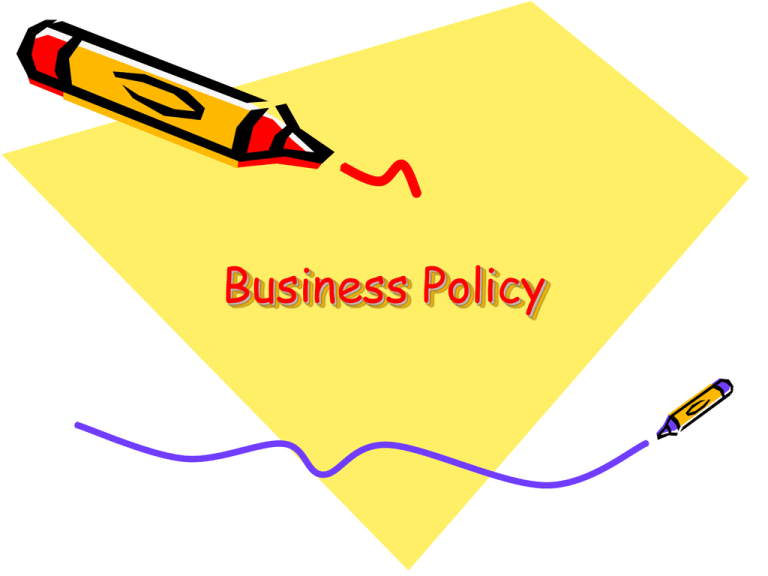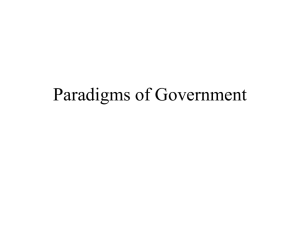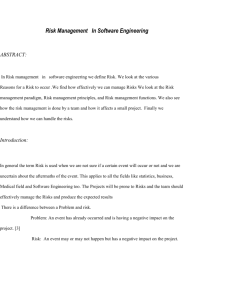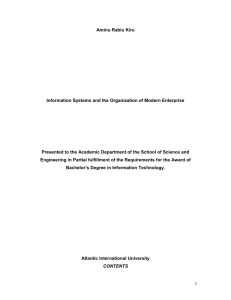Business Policy
advertisement

Business Policy Defining Business Policy • It is the aggregate of the policy guidelines of different functional areas viz. production, marketing, finance etc. in a company. • It is the major policy guidelines drawn by the board of directors to regulate the overall direction in which company should move. • It is the process of study, process of decision and process of action leading to development of effective business strategy. BUSINESS POLICY AS A DISCIPLINE • The genesis of business policy – • The origins of business policy can be traced back to 1911 when the Harvard Business School introduced an integrative course in management aimed at providing general management capability. This course was based on case studies which had been in use at the school for instruction purposes since 1908. However, the real impetus for introducing business policy in the curriculum of business schools came with the publication of two reports in 1959. BUSINESS POLICY AS A DISCIPLINE • The Gordon and Howell Report sponsored by Ford Foundation had recommended a capstone course of business policy which would give participants an opportunity to pull together what they have learned in the separate business fields and utilize this knowledge in the analysis of complex business problems. • In today’s situation business policy is considered as a integrative course offered to those who have already been through a set of core functional area courses. BUSINESS POLICY AS A DISCIPLINE • The term “Business Policy” has been used traditionally though new titles such as “Strategic Management”, “Corporate Strategy and policy” and so on are now used extensively for the course. • The discussion has so far been related to the academic status of the business policy course. • In practice however, the development has been along different lines. EVOLUTION BASED ON MANAGERIAL PRACTICES - Guleck has viewed the development in business policy as arising from the use of planning techniques by managers. Starting from day-to-day planning in earlier times managers till recently tried to anticipate the future through the preparation of budgets and by using control systems like capital budgeting and management by objectives. EVOLUTION BASED ON MANAGERIAL PRACTICES • However as these techniques were unable to emphasis the role of the future adequately, long range planning came into use. But soon, long range planning was replaced by strategic planning and later by strategic management – A term that is currently being used to describe the process of strategic decision making. Strategic Management forms the theoretical framework for business policy courses today. HISTORICAL PERSPECTIVE OF BUSINESS POLICY – • Hofer has viewed the evolution of business policy in terms of four paradigm. • For the sake of convenience, these shifts may be considered as four overlapping phases in the development of the subject of Business Policy. It is interesting to note that the development of business policy as a field of study has closely followed the demands of real – life business. • Ad hoc Policy – According to Hofer and others the first phase which can be traced back to the mid 1930’s rested on the paradigm of Ad Hoc Policy making. The need for policy making arose due to the nature of the American business firms of that period. • The firms which has originally commenced operations in a single product line catering to a unique set of customers in a limited geographical area expanded in one or all of these three dimensions. Informal control and co-ordination became partially irrelevant as expansion took place and the need to integrate functional areas arose. This integration was brought about by framing policies to guide managerial action. Policy making became the prime responsibility of erstwhile entrepreneurs who later assumed the role of senior management. Planned Policy formulation • Due to the increasing environmental changes in the 1930’s and 40’s in the U.S. planned policy formulation replaced Ad Hoc policy making. Based on this second paradigm the emphasis shifted to the integration of functional areas in a rapidly changing environment. Strategy Paradigm • Increasing complexity and accelerating changes in the environment made the planned policy paradigm irrelevant since the needs of a business could no longer be served by policy making and functional area integration only. By the 1960’s there was a demand for a critical look at the basic concept of business and its relationship to the environment. The concept of strategy satisfied this requirement and the third phase based on a strategy paradigm emerged in the early sixties. Strategic Management • The current thinking which emerged in the eighties is based on the fourth paradigm of strategic management. The initial focus of strategic management was on the intersection of two board fields enquiry : The strategic processes of business firms and the responsibilities of general management. Thompson and Strickland say “ The approaches and methods of analysis of strategic management have not yet coalesced into theory of how to manage an enterprise. But they very definitely do represent a powerful way of thinking to resolve strategic issues. • The resolution of strategic issues that affect the future of a business firm has been a continual endeavor in the subject of business policy. The endeavor is based on the development of strategic thinking. As Whitefield says “Really useful training (in strategic management should yield)… A comprehension of a few general principles with a through grounding in the way they apply to a variety of concrete details. Most likely, the students will forget the details and principles but remember (usually unconsciously) new, non – obvious ways of thinking strategically.” The general principles underlying strategic thinking have been the focus of the efforts of researchers and academicians in the field of Business Policy. Business Policy • As defined by Christensen and others, Business Policy is “The study of the function and responsibilities of Senior Management, the crucial problems that affect success in the total enterprise and the decisions that determine the direction of the organization and shape its future”. • The problems of policy in business like those of policy in public affairs have to do with – – The choice of purposes. – The molding of organizational identity and character. – The continuous definition of what needs to be done – And the mobilization of resources for the attainment of goals in the face of competition or adverse circumstances. Business Policy • This comprehensive definition covers many aspects of Business Policy – – Firstly it is considered as the study of the functions and responsibilities of the senior management related to those organizational problems which affects the success of the total enterprise. – Secondly, it deals with the determination of the future course of action that an organization has to adopt. – Thirdly, it involves a choosing the purpose and defining what needs to be done in order to mould the character and identify of an organization. – Lastly, it is also concerned with the mobilization of resources, which will help the organization to achieve its goals. THE IMPORTANCE OF BUSINESS POLICY • Business Policy is important as a course in the Management curriculum and as a component of executive development programs for middlelevel managers who are preparing to move up to the senior management level. A study of Business Policy fulfills the needs of management students as well as those middlelevel managers. We shall consider four areas where this course proves to be beneficial – • For learning the course. • For understanding the business environment. • For understanding the organization. • For personal development. • The purpose of Business Policy is three – fold – • To integrate the knowledge gained in various functional areas of management. • To adopt a generalist approach to problem solving. • To understand the complex inter-linkages operating within an organization through the use of a systems approach to decision-making and relating these to the changes taking place in the external environment.










